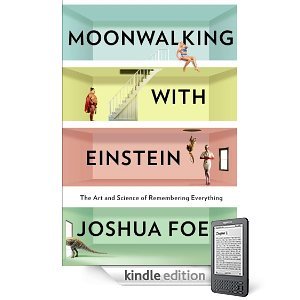More on this book
Community
Kindle Notes & Highlights
“It is always to associate the sound of a person’s name with something you can clearly imagine. It’s all about creating a vivid image in your mind that anchors your visual memory of the person’s face to a visual memory connected to the person’s name.
Experts see the world differently. They notice things that nonexperts don’t see. They home in on the information that matters most, and have an almost automatic sense of what to do with it. And most important, experts process the enormous amounts of information flowing through their senses in more sophisticated ways. They can overcome one of the brain’s most fundamental constraints: the magical number seven.
The chess experiments reveal a telling fact about memory, and about expertise in general: We don’t remember isolated facts; we remember things in context.
According to Ericsson, what we call expertise is really just “vast amounts of knowledge, pattern-based retrieval, and planning mechanisms acquired over many years of experience in the associated domain.” In other words, a great memory isn’t just a by-product of expertise; it is the essence of expertise.
Monotony collapses time; novelty unfolds it. You can exercise daily and eat healthily and live a long life, while experiencing a short one. If you spend your life sitting in a cubicle and passing papers, one day is bound to blend unmemorably into the next—and disappear. That’s why it’s important to change routines regularly, and take vacations to exotic locales, and have as many new experiences as possible that can serve to anchor our memories. Creating new memories stretches out psychological time, and lengthens our perception of our lives.
Life seems to speed up as we get older because life gets less memorable as we get older.
This phenomenon of unconscious remembering, known as priming, is evidence of an entire shadowy underworld of memories lurking beneath the surface of our conscious reckoning.
Sigmund Freud first noted the curious fact that older memories are often remembered as if captured by a third person holding a camera, whereas more recent events tend to be remembered in the first person, as if through one’s own eyes. It’s as if things that happened to us become simply things that happened. Or as if, over time, the brain naturally turns episodes into facts.
Pickled garlic Cottage cheese Salmon (peat-smoked if poss.) Six bottles of white wine Socks (x3) Three hula-hoops (spare?) Snorkel Dry ice machine E-mail Sophia Skin-toned cat suit Find Paul Newman film—Somebody Up There Likes Me Elk sausages?? Megaphone and director’s chair Harness and ropes Barometer
“Now, it’s very important to try to remember this image multisensorily.” The more associative hooks a new piece of information has, the more securely it gets embedded into the network of things you already know, and the more likely it is to remain in memory.
The brain is a costly organ. Though it accounts for only 2 percent of the body’s mass, it uses up a fifth of all the oxygen we breathe, and it’s where a quarter of all our glucose gets burned. The brain is the most energetically expensive piece of equipment in our body, and has been ruthlessly honed by natural selection to be efficient at the tasks for which it evolved.
In pre-Islamic Arabia, people known as Rawis were often attached to poets as official memorizers. The Buddha’s teachings were passed down in an unbroken chain of oral tradition for four centuries until they were committed to writing in Sri Lanka in the first century B.C. And for centuries, a group of hired tape recorders called tannaim (literally, “reciters”) memorized the oral law on behalf of the Jewish community.
“There are no limits. There are plateaus, but you must not stay there, you must go beyond them. If it kills you, it kills you.”
Brains were as organized as modern filing cabinets, with important facts, quotations, and ideas stuffed into neat mnemonic cubbyholes, where they would never go missing, and where they could be recombined and strung together on the fly.


